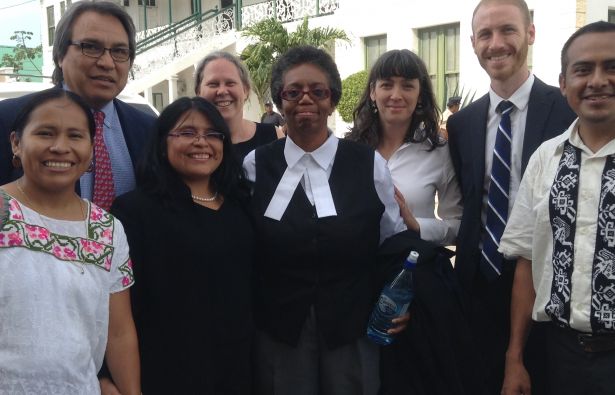The Indigenous Peoples Law and Policy Program of the (UA) University of Arizona’s James E. Rogers College of of Law has achieved another groundbreaking legal victory, this time before the Caribbean Court of Justice.
In a final resolution of the Maya land rights case before the highest court for Belize, the Caribbean Court of Justice affirmed the existence of Maya customary land tenure, significantly advancing the developing worldwide jurisprudence on indigenous peoples’ rights to lands and resources.
The Caribbean Court of Justice recently announced its judgment affirming the 2013 holding of the Court of Appeal of Belize that the Maya indigenous people of southern Belize have rights to the lands they customarily have used and occupied. In the judgment, the court affirmed that these traditional land rights, belonging to some 38 Maya villages spread out over most of Belize’s Toledo District, constitute property within the meaning of the provisions of the Belize Constitution that generally protect property free from discrimination.
For more than a decade, the IPLP Program has worked with Maya leaders and representative organizations to secure Maya rights to their traditional lands and resources. The judgment of the Caribbean Court of Justice is based on a novel legal theory developed by UA Regents’ Professor James Anaya, the co-director of the IPLP Program, in collaboration with the Montana-based Indian Law Resource Center. That theory, drawn from an evolving body of domestic and international precedents and published in the inaugural 1998 issue of the Yale Human Rights and Development Journal, was adopted by the Belize Supreme Court in 2007 and 2010 and upheld by the Court of Appeal of Belize in 2013.
IPLP attorneys Seánna Howard, Maia Campbell and Marina Waters, along with IPLP students participating in the College of Law’s International Human Rights Advocacy Workshop, worked with Anaya on the Belize case. Staff and students conducted research, helped draft court documents and traveled to Belize to assist in coordinating efforts with the Maya leaders and local counsel Antoinette Moore, who was retained by the IPLP Program to argue the case before the courts of Belize. Also assisting as local counsel in the later stages of the litigation was Monica Magnusson, who is the first licensed Maya attorney in Belize. Moira Gracey, an alumnus of the IPLP Program and now a practicing attorney, joined the IPLP team to take a leading role in developing the case as it made its way through the lower courts to the Caribbean Court of Justice.
“This judgment of the Caribbean Court of Justice sets an important precedent worldwide, building upon ever-greater recognition of the rights of indigenous peoples internationally,” Anaya said, explaining that the judgement “reinforces the international standard that indigenous peoples have collective property rights based on their own customary land tenure systems, even when they do not have a formal title or other official recognition of those rights, and that states are bound to recognize and protect those rights.”
Complementing and informing the domestic litigation, the Inter-American Commission on Human Rights, an agency of Organization of American States, issued a report in 2004 finding in favor of Maya land rights in Belize in terms similar to the recent judgment. The IPLP Program, which, along with the Indian Law Resource Center, litigated the case before the Inter-American Commission, also has assisted Maya leaders to raise the land-rights issue to United Nations bodies.
The Caribbean Court of Justice order, entered into on consent of the parties, requires the government of Belize to take measures to identify and protect Maya property and other rights arising from customary land tenure and to abstain from interference with these rights unless consultation occurs in order to obtain Maya consent. This means that the government of Belize may not issue any leases, grants, permits, concessions or contracts to lands or resources authorizing logging, petroleum, mineral extraction or any other activities that would affect Maya property rights.
With this final recognition and protection of rights by the highest court in Belize, the Maya people can refocus their attention on governance-building and strengthening their communities, a process that will guide other indigenous nations.
The IPLP Program provides training and promotes research on issues concerning indigenous peoples worldwide. It offers legal assistance to indigenous peoples and their communities in matters before domestic and international human rights forums.



